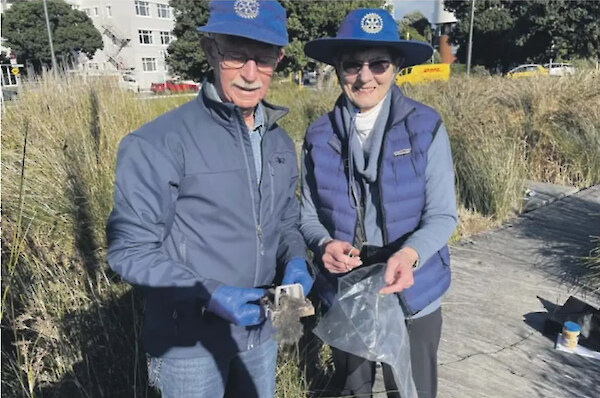Rotary on waterfront patrol
This article was originally written by our Board Chairperson Tim Pankhurst and published by The Post on 22 June 2024. See original article here.
The harbour is an ironing board on a cruisy early winter Saturday morning.
But Paula McKnight and Dennis Small have no time to join the strollers, joggers, coffee drinkers, lovers, pram pushers, dog walkers, hopeful fishers, skateboarders, scooters and cyclists – they are on a mission. Rotarians Dennis Small and Paula McKnight on waterfront rodent patrol
Rotarians Dennis Small and Paula McKnight on waterfront rodent patrol
The two 76-year-old Rotarians are doing a fortnightly rodent run, checking 19 traps set around the waterfront.
The Port Nicholson Rotary Club joined the predator free movement five years ago when it placed tunnel traps provided by Wellington City Council between Frank Kitts Park and across Te Papa to Waitangi Park and has patrolled them since.
The club’s 55 members are tireless fund raisers and volunteers, supporting everything from Malaghan Institute cancer research and Lifting the Lid on youth mental health, to young mothers at the House of Grace and stoves for Nepali villagers.
As a community supporter, the club is also making a financial contribution to Predator Free Wellington. “I hate mice and rats,” McKnight admits.
“I run a mile when I see them. It’s something I don’t actually like doing. I do it because I’m a Rotarian and I like helping people.”
Small, a member of the Mt Victoria Rotary Club, does the dirty work, shaking any dead rodents out of the traps, while the closest McKnight likes to venture is to putting a large dollop of peanut butter bait on the trap trigger.
She also holds a plastic bag open, her head turned away, to receive any corpses before they are placed in a rubbish bin.
The pair are former work colleagues. The always stylishly dressed McKnight, as head of the School of Fashion and Food at Wellington Polytechnic, was Small’s boss, where he was a tutor in the becoming a Te Papa tour host.
He is motivated by wanting to contribute to the community and the city “in some small way that can help to keep it looking good and also in terms of pest control and protection of the environment”.
The beat begins in the shrubs by the Star Boating Club between the rocks of the harbour edge and the lagoon, before crossing to the trees on the edge of Frank Kitts Park. As well as a haven for rodents, the shelter beneath a spreading pohutukawa is favoured by homeless sleeping rough.
In the agapanthus alongside Jervois Quay, the traps are still set but the baits are gone, the peanut butter favoured by snails that are too light to trigger the spring.
The flaxes, cabbage trees and pōhutukawa alongside the western wall of Te Papa harbour more traps among discarded cans and bottles that are duly collected and deposited in the nearby bins.
The rear of Te Papa conceals a hidden gem. Up the steps that advise they are not an entrance to the museum lies a green lawn, perfect for a picnic, surrounded by some school, later large trees that include home to gurgling tūī.
Then it is on to Waitangi Park, site of a former Te Ātiawa pa and a hub of the flax trade, where council engineers and planners and park staff have done a top job in rescuing an urban stream from the city’s stormwater network.
The Waitangi Stream flows clear here, filtered by dense reeds and water cresses.
Several traps are set in the tangled muehlenbeckia and grasses along its edge.
The day’s cull at the end of the round is modest, just two mice – a good sign.
The Rotarians are just one of scores of various businesses, volunteers and organisations, including 58 trapping groups across Wellington, supporting the Predator Free Wellington vision of restoring native birdlife to the city, and ultimately, the entire country.
The many supporters include Wellington Airport, an effective buffer zone to the eastern suburbs, and Wellington-based nut butter manufacturers Fix & Fogg, founded by Roman and Andrea Jewell. Their product was judged New Zealand’s best in a 2023 Stuff sampling and rodents love it too.
And more than 200 volunteers are ensuring Miramar Peninsula remains predator kauri and tōtara, free as the focus shifts to phase two from Ōwhiro Bay north to the city.
The importance of bringing Nature back to our cities was highlighted by anthropologist Dr Jane Goodall, famed for her ground breaking research on chimpanzees, on a visit to Wellington last week in support of her institute and Roots & Shoots youth education programme.
“The most invasive species is humans,” the 90-year-old Goodall said in a function hosted by Governor-General Dame Cindy Kiro at Parliament. “Wise apes don’t destroy their own home. Every single one of us has an impact on the planet every single day and we have to choose what sort of impact we have. Hope isn’t just wishing, it’s doing something about it.”
Which, in their own small way, is exactly what the Rotarians and all the other volunteers and support organisations are practising.
Posted: 22 June 2024
